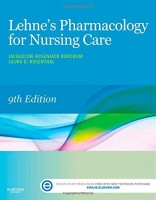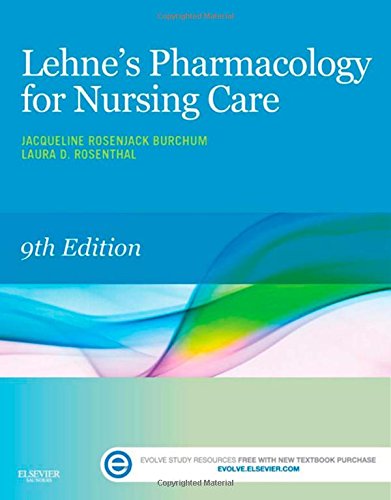 Authors: Jacqueline Rosenjack Burchum, DNSc, and Laura D. Rosenthal, DNP
Authors: Jacqueline Rosenjack Burchum, DNSc, and Laura D. Rosenthal, DNP
Publisher: Elsevier Saunders – 1,414 pages
Book Review by: Laxmi Chaandi
This book has been written for nursing students and practitioners to provide them information about many of the common drugs being used today for various ailments, disorders, and diseases of the different parts of the body, such as the circulatory, digestive, endocrine, excretory, muscular, nervous, reproductive, respiratory, and skeletal systems, to name some.
The authors write in their Preface that despite the fact that pharmacology pervades all aspects of nursing practice and patient care, many students, and even some teachers, are uncomfortable with it. Why? Because other textbooks have emphasized that in order to learn the effects and uses of drugs, memorization is necessary.
This book takes a different approach: it provides understanding as the means to learning. It has two basic purposes:
- To help you, the nursing student, establish a knowledge base in the basic science of drugs
- To show you how that knowledge can be applied in clinical practice.
These are the methods Drs. Burchum and Rosenthal use to accomplish the above two purposes:
- Laying foundations in basic principles
- Reviewing physiology and pathophysiology
- Teaching throughout prototypes
- Using clinical reality to prioritize content
- Nursing Implications: demonstrating the application of pharmacology in nursing care
- Providing useful new content in the teaching process
- Offering learning supplements to students and teaching aids to instructors
- Showing the different ways to use this textbook
The materials used in the book’s over 1,400 pages are available in 110 chapters organized round 20 chapters which we outline for you below to give you a sort of bird’s eye view. You will also find at the end of this book an Appendix entitled Canadian Drug Information.
- Introduction
- Basic Principles of Pharmacology
- Drug Therapy Across the Life Span
- Peripheral Nervous System Drugs
- Central Nervous System Drugs
- Drugs That Affect Fluid and Electrolyte Balance
- Drugs That Affect the Heart, Blood Vessels, and Blood
- Drugs for Endocrine Disorders
- Women’s Health
- Men’s Health
- Anti-Inflammatory, Anti-Allergic, and Immunologic Drugs
- Drugs for Bone and Joint Disorders
- Respiratory Tract Drugs
- Gastrointestinal Drugs
- Nutrition
- Chemotherapy of Infectious Diseases
- Chemotherapy of Parasitic Diseases
- Cancer Chemotherapy
- Miscellaneous Drugs and Therapies
- Toxicology
The material laid out in the book’s chapters is organized to facilitate learning, understanding, and retention of the meaning of important concepts, key terms, and properties of drugs. The book uses various teaching aids to make learning easier for you the student. The best way to show you this is to take a look at a chapter.
Chapter 1, Orientation in Pharmacology, provides a shaded area on the top left of its first page that outlines what is covered in the chapter, and what pages. So you will find in that area the following:
- Four Basic Terms
- Properties of an Ideal Drug
- The Therapeutic Objective
- Factors That Determine the Intensity of Drug Responses
- Key Points
The discussions of topics are short, making for “easier swallowing” of small bites of information. And the authors use visual aids such as charts and tables to present data.
Below is a list of special-interest topics that Dr. Lehne developed. They are presented throughout this book, with box and page numbers indicated below.
Box No. Page Title
7-1 70 Medication Reconciliation
17-1 151 The EpiPen: Don’t Leave Home Without It
30-1 307 Medication Overuse Headache: Too Much of a Good Thing
32-1 340 Peripartum Depression
34-1 379 Melatonin, Keeper of the Circadian Clock
39-1 424 Smoking Cessation During Pregnancy
48-1 524 Attention: Digoxin May Be Hazardous to Women’s Health
61-1 738 Premenstrual Disorder
62-1 762 Emergency Contraception
65-1 791 Testosterone Replacement: Can It Enhance Sexuality in Men or Women?
78-1 955 Gastro-esophageal Reflux Disease
81-1 990 The Increasingly Strong Case Against Antioxidants
83-1 1006 Antibiotics in Animal Feed: Dying for a Hamburger and Chicken Nuggets
84-1 1017 Methicillin-Resistant Staphylococcus aureus
85-1 1031 Clostridium difficile Infection
Authors:
Jacqueline Lee Rosenjack Burchum, DNSc, FNP-BC, CNE is Associate Professor in the College of Nursing in the Department of Advanced Practice and Doctoral Studies at the University of Tennessee Health Science Center in Memphis, Tennessee.
Dr. Burchum earned her Bachelor of Science in Nursing degree from Union University in Jackson, Tennessee, and both the Masters of Science in Nursing and the Doctor of Nursing Science degree from the University of Tennessee Health Science Center.
As a nurse practitioner and researcher, her work has centered on addressing the needs of vulnerable populations with a special focus on immigrant and refugee populations. As an educator, she has a special interest in online teaching and program quality.
Laura D. Rosenthal, RN, DNP, ACNP-BC is Associate Professor in the College of Nursing, and Assistant Professor in the School of Medicine, at University of Colorado Anschutz Medical Campus in Denver, Colorado.
She has been a registered nurse since graduating with a Bachelor of Science in Nursing degree from the University of Michigan in 2000. She completed her Master of Science in Nursing program in 2006 at Case Western Reserve University in Cleveland, Ohio. She obtained her Doctor of Nursing Practice degree in 2011 from the University of Colorado.
Dr. Rosenthal received the Dean’s Award for Excellence in Teaching in 2013 from the University of Colorado. She is a member of the Allied Health Committee at the University of Colorado Hospital, and an active member of the Sigma Theta Tau International Honor Society of Nursing.
Consultants:
Beth Outland Jones, PharmD is Clinical Pharmacist at Missouri Baptist Medical Center in St. Louis, Missouri.
Joshua J. Neumiller, PharmD, CDE, FASCP is Assistant Professor of Pharmacotherapy at Washington State University in Spokane, Washington.
Contributors:
Valerie O’Toole Baker, RN, MSN, ACNS, BC; Nancy Haugen, PhD, RN; Tiffany Jakubowski, BSN, RN; Marie Lauer-Pfrommer, PhD, APN-C, CNE; Tara McMillan-Queen, RN,MSN, ANP,GNP; Kathryn Schartz, RN, MSN,CPNP; Allison Terry, PhD, MSN, RN; and Jennifer Yeager, PhD, RN,ANP-BC.







